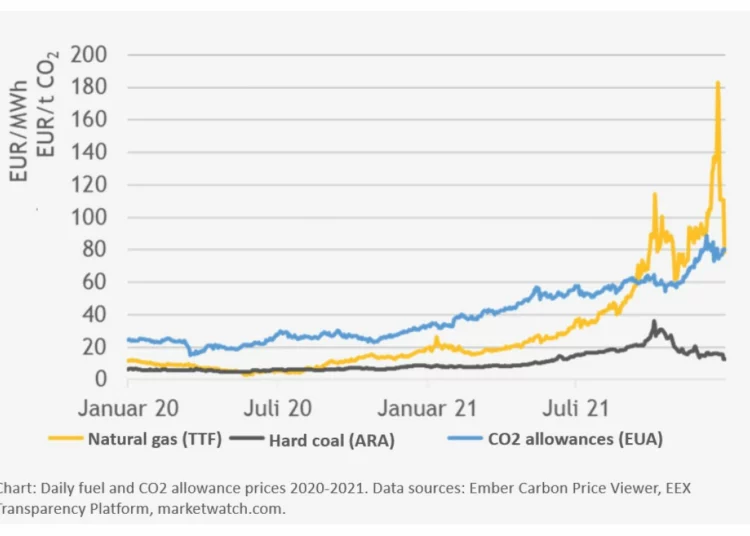Nigeria’s inflation rate rose from 20.77 per cent in September 2022 to 21.09 per cent in October 2022 amid soaring food prices, the National Bureau of Statistics (NBS) has said.
The Bureau also said that food Inflation was 23.72 per cent in October 2022, from 23.34 per cent in September 2022.
The NBS made this known in its Consumer Price Index (CPI) report for October 2022 released yesterday.
The CPI measures the rate of change in prices of goods and services.
“On a month-on-month basis, the headline inflation rate for October 2022 was 1.24 per cent, this was 0.11 percent lower than the
rate recorded in September 2022 (1.36 per cent). This means that in October 2022 the general price level for the headline inflation rate (month–on–month basis) declined by 0.11 per cent,” the report in part.
“The percentage change in the average CPI for the twelve months ending October 2022 over the average of the CPI for the previous 12 months period was 17.86 per cent, showing a 0.91 per cent increase compared to the 16.96 percent recorded in October 2021.”
The NBS blamed the rising inflate rate on importation cost, high energy cost, surging food prices amongst others.
“On a year-on-year basis, in October 2022, the urban inflation rate was 21.63 per cent, 5.11 per cent higher compared to the 16.52 per cent recorded in October 2021. On a month-on-month basis, the urban inflation rate was 1.33 percent in October 2022, this was a 0.12 percent decline compared to September 2022 (1.46 per cent).”
Reacting this development, analysts at Cowry Assets Management cited the rise in energy costs which is reflective of the increases in fuel prices (diesel and kerosene) coupled with the depreciating Naira and rising airfare prices as factors responsible for the rising inflation rate.
The analysts, in an emailed note, said the headline inflation outlook remained elevated when the recent flooding which affected many food-producing states amongst other issues in the country are taken into account.
“For the Monetary Policy Committee (MPC), there is little room for another rate tweak at its next meeting after the rate hikes this year in the bid to tame inflationary pressure, following this marginal acceleration. Thus, we expect a moderate rate hike at the next MPC meeting by around 25 basis points. That being said, we project headline inflation to hit 21.5 per cent in November,” analysts at Cowry Assets Management pointed out.
Similarly, analysts at Financial Derivatives Company, who had predicted that inflation would rise to 20.32 per cent in October 2022, said they expect that prices will continue to surge.
“In contrast to the general expectation that harvest would drive down market prices, the food basket experienced a faster rate of price acceleration and that it can be attributed to the significant shortage in the supply of agricultural products as a result of the floods that ravaged major food-producing states.
“Furthermore, the interaction of higher logistic costs and the exchange rate pass-through effect is keeping the price of the non-food basket above reach. The impact of the floods that swept more than 26 states under water will continue to undermine the positive impact of the harvest period. Typically, Nigerian headline inflation and food inflation taper from September to November every year, reflecting the core harvests that occur in the period.
“However, the recent floods in the major food-producing states will rob the country of the price-moderation effects of the harvest season. This, coupled with higher logistics costs, that have been exacerbated by the resurfaced fuel scarcity in the major cities, will keep food inflation elevated in the coming months. Food inflation has maintained an upward trend since January. It has increased by 6.21 per cent in the last 10 months, they pointed out.
Meanwhile, analysts at Cordros Securities Limited said consumer prices maintained their uptrend for the ninth consecutive month, notching higher by 31bps to 21.09 per cent year-on-year as existing challenges remain intact coupled with the impact of base effects from the prior year.
On outlook, Cordros Securities stated that “we expect food prices to maintain their uptrend in November, given the below average primary harvest season worsened by the high flooding incidence across the country.
“Besides, food demand is expected to be high in November owing to the increased consumption associated with year-end festivities, magnifying the food supply-demand gap. In addition, we understand the lingering currency weakness continues to exacerbate food import costs coupled with the high global food prices.”
On his part, Tope Fasua, an economist, said he believes that the worst is over in terms of rising inflation as he expressed optimism that there will be a downward trend in the coming months.
“The inflation rate is to be expected. I believe the increase will trend downward with time.”





